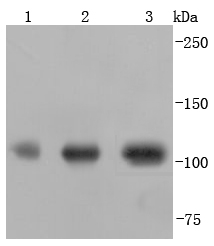Product Name :
PGC1α/β polyclonal antibody Background :
Transcription factors exert their effects by associating with co-activator or corepressor proteins. The co-activator complexes are thought to be constitutively active, requiring only proper positioning in the genome to initiate transcription. Co-activators include the steroid receptor coactivator (SRC) and CREB binding protein (CBP) families that contain histone acetyltransferase (HAT) activity, which modifies chromatin structure. PPARgamma co-activator-1 (PGC-1) is a transcriptional cofactor of nuclear respiratory factor-1 (NRF-1), PPARbeta, PPARalpha and other nuclear receptors that is induced by exposure to cold temperatures and is involved in regulating thermogenic gene expression, protein uncoupling, and mitochondrial biogenesis. PGC-1 has a low inherent transcriptional activity when it is not bound to a transcription factor. Docking of PGC-1 to PPARgamma stimulates an apparent conformational change that then enables PGC-1 to bind to and assemble into complexes, which include the additional cofactors SRC-1 and CBP/p300, and results in a large increase in transcriptional activity. Product :
Rabbit IgG, 1mg/ml in PBS with 0.02% sodium azide, 50% glycerol, pH7.2 Storage&Stability :
Store at +4°C after thawing. Aliquot store at -20°C or -80°C. Avoid repeated freeze / thaw cycles. Specificity :
PGC1α/β polyclonal antibody detects endogenous levels of PGC1α/β protein. Immunogen :
recombinant protein Conjugate :
Unconjugated Modification :
Unmodification
PGC1α/β polyclonal antibody Background :
Transcription factors exert their effects by associating with co-activator or corepressor proteins. The co-activator complexes are thought to be constitutively active, requiring only proper positioning in the genome to initiate transcription. Co-activators include the steroid receptor coactivator (SRC) and CREB binding protein (CBP) families that contain histone acetyltransferase (HAT) activity, which modifies chromatin structure. PPARgamma co-activator-1 (PGC-1) is a transcriptional cofactor of nuclear respiratory factor-1 (NRF-1), PPARbeta, PPARalpha and other nuclear receptors that is induced by exposure to cold temperatures and is involved in regulating thermogenic gene expression, protein uncoupling, and mitochondrial biogenesis. PGC-1 has a low inherent transcriptional activity when it is not bound to a transcription factor. Docking of PGC-1 to PPARgamma stimulates an apparent conformational change that then enables PGC-1 to bind to and assemble into complexes, which include the additional cofactors SRC-1 and CBP/p300, and results in a large increase in transcriptional activity. Product :
Rabbit IgG, 1mg/ml in PBS with 0.02% sodium azide, 50% glycerol, pH7.2 Storage&Stability :
Store at +4°C after thawing. Aliquot store at -20°C or -80°C. Avoid repeated freeze / thaw cycles. Specificity :
PGC1α/β polyclonal antibody detects endogenous levels of PGC1α/β protein. Immunogen :
recombinant protein Conjugate :
Unconjugated Modification :
Unmodification
-
 Western blot analysis of PGC1 alpha+beta on different lysates using anti-PGC1 alpha+beta antibody at 1/1,000 dilution. Positive control: Lane 1: Mouse brain Lane 2: Mouse heart Lane 3: Mouse kidney
Western blot analysis of PGC1 alpha+beta on different lysates using anti-PGC1 alpha+beta antibody at 1/1,000 dilution. Positive control: Lane 1: Mouse brain Lane 2: Mouse heart Lane 3: Mouse kidney
Glucagon-like peptide-1/glucose-dependent insulinotropic polypeptide dual receptor agonist DA-CH5 is superior to exendin-4 in protecting neurons in the 6-hydroxydopamine rat Parkinson model
PMCID: Pubmed No.:33433498
Rutin promotes white adipose tissue “browning” and brown adipose tissue activation partially through the calmodulin-dependent protein kinase kinase β/AMP-activated protein kinase pathway
PMCID: Pubmed No.:34719526
Mitochondrial fusion induced by transforming growth factor-β1 serves as a switch that governs the metabolic reprogramming during differentiation of regulatory T cells
PMCID: Pubmed No.:37116255
Bioworld Biotech only provide peptides for our antibodies and do not provide additional peptide customization services.
Price/Size :
USD 368/1mg/vial
Tips:
For phospho antibody, we provide phospho peptide(0.5mg) and non-phospho peptide(0.5mg).Describe :
Blocking peptides are peptides that bind specifically to the target antibody and block antibody binding. These peptide usually contains the epitope recognized by the antibody. Antibodies bound to the blocking peptide no longer bind to the epitope on the target protein. This mechanism is useful when non-specific binding is an issue, for example, in Western blotting (WB) and Immunohistochemistry (IHC). By comparing the staining from the blocked antibody versus the antibody alone, one can see which staining is specific; Specific binding will be absent from the western blot or IHC performed with the neutralized antibody.Formula:
Synthetic peptide was lyophilized with 100% acetonitrile and is supplied as a powder. Reconstitute with 0.1 ml DI water for a final concentration of 10 mg/ml.The purity is >90%,tested by HPLC and MS.
Storage:
The freeze-dried powder is more stable. For short time at 2-8°C. For long term storage store at -20°C.
Note :
This product is for research use only (RUO only). Not for use in diagnostic or therapeutic procedures.
 PGC1α/β polyclonal antibody
PGC1α/β polyclonal antibody  Datasheet
Datasheet COA
COA MSDS
MSDS SHIP
SHIP